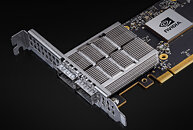- Joined
- Aug 19, 2017
- Messages
- 2,971 (1.06/day)
According to sources close to The Information, Microsoft is developing a new custom networking card that could lessen the grip of NVIDIA's networking division, formed by the acquisition of Mellanox, on Microsoft server equipment. The card is reportedly intended to resemble NVIDIA's ConnectX-7 model, which supports 400 Gb Ethernet at maximum bandwidth. However, given that the chip is not out yet and availability is still far off, the final design could aim at a higher bandwidth (800 GbE, for example). Leading the network card project is Pradeep Sindhu, who previously co-founded Juniper Networks. Microsoft acquired Sindhu's latest startup, Fungible, last year, bringing him on board to head up this effort. By creating its own high-speed networking hardware tailored for AI workloads, Microsoft aims to accelerate and lower the cost of model training for AI ambitions, as well as reduce reliance on NVIDIA as the primary supplier of high-performance networking cards.
The Information's sources say developing the new network card will take over a year. But if successful, Microsoft's infrastructure could get a performance uplift from specific optimizations needed in its hyperscale data centers. The card may also enable energy savings compared to NVIDIA's networking gear. This would aid Microsoft in keeping its AI training costs in check even as model sizes rapidly scale up. In the long term, having custom networking technology purpose-built for AI could give Microsoft a competitive advantage, granting more granular control over its data center hardware for evolving AI workloads from OpenAI and other partners. Though NVIDIA GPUs currently dominate AI acceleration, alternatives such as Microsoft's Maia chip and future networking cards could loosen its grip. As AI permeates more business and consumer applications, Microsoft is making big bets on next-gen infrastructure for an AI-centric future.

View at TechPowerUp Main Site | Source
The Information's sources say developing the new network card will take over a year. But if successful, Microsoft's infrastructure could get a performance uplift from specific optimizations needed in its hyperscale data centers. The card may also enable energy savings compared to NVIDIA's networking gear. This would aid Microsoft in keeping its AI training costs in check even as model sizes rapidly scale up. In the long term, having custom networking technology purpose-built for AI could give Microsoft a competitive advantage, granting more granular control over its data center hardware for evolving AI workloads from OpenAI and other partners. Though NVIDIA GPUs currently dominate AI acceleration, alternatives such as Microsoft's Maia chip and future networking cards could loosen its grip. As AI permeates more business and consumer applications, Microsoft is making big bets on next-gen infrastructure for an AI-centric future.

View at TechPowerUp Main Site | Source










